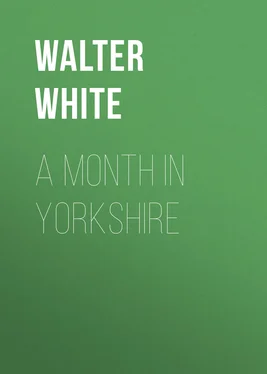Walter White - A Month in Yorkshire
Здесь есть возможность читать онлайн «Walter White - A Month in Yorkshire» — ознакомительный отрывок электронной книги совершенно бесплатно, а после прочтения отрывка купить полную версию. В некоторых случаях можно слушать аудио, скачать через торрент в формате fb2 и присутствует краткое содержание. Жанр: Путешествия и география, История, foreign_edu, foreign_antique, foreign_prose, на английском языке. Описание произведения, (предисловие) а так же отзывы посетителей доступны на портале библиотеки ЛибКат.
- Название:A Month in Yorkshire
- Автор:
- Жанр:
- Год:неизвестен
- ISBN:нет данных
- Рейтинг книги:3 / 5. Голосов: 1
-
Избранное:Добавить в избранное
- Отзывы:
-
Ваша оценка:
- 60
- 1
- 2
- 3
- 4
- 5
A Month in Yorkshire: краткое содержание, описание и аннотация
Предлагаем к чтению аннотацию, описание, краткое содержание или предисловие (зависит от того, что написал сам автор книги «A Month in Yorkshire»). Если вы не нашли необходимую информацию о книге — напишите в комментариях, мы постараемся отыскать её.
A Month in Yorkshire — читать онлайн ознакомительный отрывок
Ниже представлен текст книги, разбитый по страницам. Система сохранения места последней прочитанной страницы, позволяет с удобством читать онлайн бесплатно книгу «A Month in Yorkshire», без необходимости каждый раз заново искать на чём Вы остановились. Поставьте закладку, и сможете в любой момент перейти на страницу, на которой закончили чтение.
Интервал:
Закладка:
Stukely, who crossed the estuary during one of his itineraries, remarks: “Well may the Humber take its name from the noise it makes. My landlord, who is a sailor, says in a high wind ’tis incredibly great and terrible, like the crash and dashing together of ships.” The learned antiquary alludes probably to the bore, or ager as it is called, which rushes up the stream with so loud a hum that the popular mind seeks no other derivation for Humber. Professor Phillips, in his admirable book on Yorkshire, cites the Gaelic word Comar , a confluence of two or more waters, as the origin; and Dr. Latham suggests that Humber may be the modified form of Aber or Inver. Drayton, in Polyolbion , chants of a tragical derivation; and as I take it for granted, amicable reader, that you do not wish to travel in a hurry, we will pause for a few minutes to listen to the debate of the rivers, wherein “thus mighty Humber speaks:”
“My brave West Riding brooks, your king you need not scorn,
Proud Naiades neither ye, North Riders that are born,
My yellow-sanded Your, and thou my sister Swale
That dancing come to Ouse, thro’ many a dainty dale,
Do greatly me enrich, clear Derwent driving down
From Cleveland; and thou Hull, that highly dost renown,
Th’ East Riding by thy rise, do homage to your king,
And let the sea-nymphs thus of mighty Humber sing;
That full an hundred floods my wat’ry court maintain
Which either of themselves, or in their greater’s train
Their tribute pay to me; and for my princely name,
From Humber king of Hunns, as anciently it came,
So still I stick to him: for from that Eastern king
Once in me drown’d, as I my pedigree do bring:
So his great name receives no prejudice thereby;
For as he was a king, so know ye all that I
Am king of all the floods, that North of Trent do flow;
Then let the idle world no more such cost bestow,
Nor of the muddy Nile so great a wonder make,
Though with her bellowing fall, she violently take
The neighbouring people deaf; nor Ganges so much praise,
That where he narrowest is, eight miles in broadness lays
His bosom; nor so much hereafter shall be spoke
Of that (but lately found) Guianian Oronoque,
Whose cataract a noise so horrible doth keep
That it even Neptune frights: what flood comes to the deep,
Than Humber that is heard more horribly to roar?
For when my Higre comes, I make my either shore
Even tremble with the sound, that I afar do send.”
The view of Hull seen from the water is much more smoky than picturesque. Coming nearer we see the Cornwallis anchored off the citadel, looking as trim and earnest as one fancies an English seventy-four ought to look, and quite in keeping with the embrasured walls through which guns are peeping on shore. The quay and landing-places exhibit multifarious signs of life, especially if your arrival occur when the great railway steam-ferry-boat is about to start. There is, however, something about Hull which inspires a feeling of melancholy. This was my third visit, and still the first impression prevailed. It may be the dead level, or the sleepy architecture, or the sombre colour, or a combination of the three, that touches the dismal key. “Memorable for mud and train oil” was what Etty always said of the town in which he served an apprenticeship of seven weary years; yet in his time there remained certain picturesque features which have since disappeared with the large fleet of Greenland whale-ships whereof the town was once so proud:—now migrated to Peterhead. However, we must not forget that Hull is the third port in the kingdom; that nearly a hundred steamers arrive and depart at regular intervals from over sea, or coastwise, or from up the rivers; that of the 4000 tons of German yeast now annually imported, worth nearly £200,000, it receives more than two-thirds; that it was one of the first places to demonstrate the propulsion of vessels by the power of steam. Nor will we forget that we are in one of the towns formerly held in wholesome dread by evil-doers when recommendation to mercy was seldom heard of, as is testified by the thieves’ litany of the olden time, thus irreverently phrased:
“From Hull, Hell, and Halifax,
Good Lord deliver us.”
Halifax, however, stood pre-eminent for sharp practice; a thief in that parish had no chance of stealing twice, for if he stole to the value of thirteenpence halfpenny, he was forthwith beheaded.
Andrew Marvell need not have been so severe upon the Dutch, considering how much there was in his native county similar in character and aspect to that which he satirised. You soon discover that this character still prevails. Is not the southern landing place of the steam-ferry named New Holland? and here in Hull, whichever way you look, you see masts, and are stopped by water or a bridge half open, or just going to open, whichever way you walk. It is somewhat puzzling at first; but a few minutes’ survey from the top of the High Church affords an explanation.
Following the line once occupied by the old fortifications—the walls by which Parliament baffled the king—the docks form a continuous water-communication from the river Hull on one side to the Humber on the other, so that a considerable portion of the town has become an island, and the sight of masts and pennons in all directions, some slowly moving, is accounted for. At the opening of the Junction Dock in 1829, whereby the desired connection was established, the celebration included circumnavigation of the insular portion by a gaily decorated steamer.
The amphibious Dutch-looking physiognomy thus produced is further assisted by the presence of numerous windmills in the outskirts, and the levelness of the surrounding country. A hundred years ago, and the view across what is now cultivated fields would have comprehended as much water as land, if not more. Should a certain popular authoress ever publish her autobiography, she will, perhaps, tell us how Mr. Stickney, her father, used when a boy to skate three or four miles to school over unreclaimed flats within sight of this church tower of Hull, now rich in grass and grain. Only by a system of drainage and embankment on a great scale, and a careful maintenance, has the reclamation of this and other parts of Holderness been accomplished. Taylor, the water-poet, who was here in 1632, records,
“It yearly costs five hundred pounds besides
To fence the towne from Hull and Humber’s tydes,
For stakes, for bavins, timber, stones, and piles,
All which are brought by water many miles;
For workmen’s labour, and a world of things,
Which on the towne excessive charges brings.”
British liberty owes something to this superabundance of water. Hull was the first town in the kingdom to shut its gates against the king and declare for the people, and was in consequence besieged by Charles. In this strait, Sir John Hotham, the governor, caused the dikes to be cut and sluices drawn, and laid the whole neighbourhood under water, and kept the besiegers completely at bay. The Royalists, to retaliate, dug trenches to divert the stream of fresh water that supplied the town,—a means of annoyance to which Hull, from its situation, was always liable. In the good old times, when the neighbouring villagers had any cause of quarrel with the townsfolk, they used to throw carrion and other abominations into the channel, or let in the salt-water, nor would they desist until warned by a certain Pope in an admonitory letter.
The church itself, dedicated to the Holy Trinity, is a handsome specimen of florid Gothic, dating from the reign of Edward II. You will perhaps wish that the effect of the light tall columns, rising to the blue panelled roof, were not weakened by the somewhat cold and bare aspect of the interior. If you are curious about bells, there are inscriptions to be deciphered on some of those that hang in the tower; and in the belfry you may see mysterious tables hanging on the wall of ‘grandsire bobs,’ and ‘grandsire tripples;’ things in which the ringers take pride, but as unintelligible to the uninitiated as Babylonish writing. There, too, hangs the ringers’ code of laws, and a queer code it is! One of the articles runs:—“Every Person who shall Ring any Bell with his Hat or Spurs on, shall Forfeit and Pay Sixpence, for the Use of the Ringers.” And the same fine is levied from “any Person who shall have Read Any of these Orders with his Hat upon his Head;” from which, and the characteristic touches in the other “orders,” you will very likely come to some strange conclusions respecting the fraternity of ringers.
Читать дальшеИнтервал:
Закладка:
Похожие книги на «A Month in Yorkshire»
Представляем Вашему вниманию похожие книги на «A Month in Yorkshire» списком для выбора. Мы отобрали схожую по названию и смыслу литературу в надежде предоставить читателям больше вариантов отыскать новые, интересные, ещё непрочитанные произведения.
Обсуждение, отзывы о книге «A Month in Yorkshire» и просто собственные мнения читателей. Оставьте ваши комментарии, напишите, что Вы думаете о произведении, его смысле или главных героях. Укажите что конкретно понравилось, а что нет, и почему Вы так считаете.












